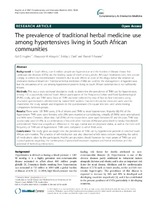| dc.contributor.author | Hughes, Gail | |
| dc.contributor.author | Aboyade, Oluwaseyi | |
| dc.contributor.author | Clark, Bobby | |
| dc.contributor.author | Puoane, Thandi | |
| dc.date.accessioned | 2015-11-04T07:12:12Z | |
| dc.date.available | 2015-11-04T07:12:12Z | |
| dc.date.issued | 2013 | |
| dc.identifier.citation | Hughes, G.D. et al. (2013). The prevalence of traditional herbal medicine use among hypertensives living in South African communities. BMC Complementary and Alternative Medicine, 13 (38): 1-8 | en_US |
| dc.identifier.issn | 1472-6882 | |
| dc.identifier.uri | http://hdl.handle.net/10566/1953 | |
| dc.description.abstract | BACKGROUND: In South Africa, over 6 million people are hypertensive and the burden of disease shows that cardiovascular diseases (CVDs) are the leading cause of death among adults. Although treatments exist, few people comply or adhere to recommended treatment due to side effects or costs of the drugs, hence the reliance on alternative forms of treatment. Traditional herbal medicines (THM) are used for the management of hypertension but the prevalence of its use among hypertensive patients living in South African communities is not sufficiently known. METHODS: This was a cross-sectional descriptive study to determine the prevalence of THM use for hypertension, among 135 purposefully selected South African participants of the Prospective Urban and Rural Epidemiological (PURE) study, who are THM users. Data on THM use were collected by way of face to face interviews using structured questionnaires administered by trained field workers. Standard descriptive measures were used to characterize the study sample and responses to the questionnaire. Chi-square test was used when making comparisons between groups. RESULTS: There were 135 THM users, 21% of whom used THM to treat hypertension. Majority (82.1%) of the hypertensive THM users were females, only 29% were married or co-habitating, virtually all (96%) were unemployed and 86% were Christians. More than half (56%) of the respondents were aged between 55 and 64 years. THM was occasionally used (51.9%) as a combination of tea and other mixtures (63%) and prescribed by family/ friends/selfadministered. There was a significant difference in the age, marital and employment status, as well as the form and frequency of THM use of hypertensive THM users compared to other THM users. CONCLUSIONS: The study gives an insight into the prevalence of THM use by hypertensive patients in selected South African communities. The practice of self-medication was also observed which raises concern regarding the safety of medications taken by the participants. Health care providers should however be more aware of THM use and counsel patients regarding the combination of prescribed treatment regimen and herbal medicines and the potential of herb-drug interactions. | en_US |
| dc.language.iso | en | en_US |
| dc.publisher | Biomedcentral | en_US |
| dc.rights | This is an Open Access article distributed under the terms of the Creative
Commons Attribution License (http://creativecommons.org/licenses/by/2.0), which permits unrestricted use, distribution, and reproduction in any medium, provided the original work is properly cited. | |
| dc.source.uri | http://dx.doi.org/10.1186/1472-6882-13-38 | |
| dc.subject | Traditional herbal medicine | en_US |
| dc.subject | Hypertension | en_US |
| dc.subject | South Africa | en_US |
| dc.subject | Cardiovascular disease | |
| dc.title | The prevalence of traditional herbal medicine use among hypertensives living in South African communities | en_US |
| dc.type | Article | en_US |
| dc.privacy.showsubmitter | false | |
| dc.status.ispeerreviewed | true | |
| dc.description.accreditation | Web of Science | en_US |

